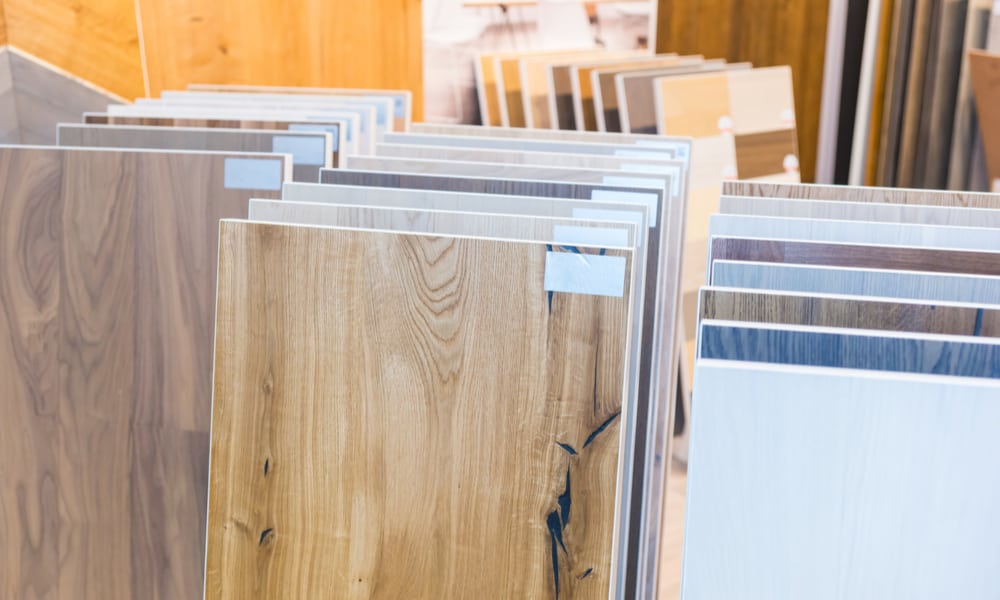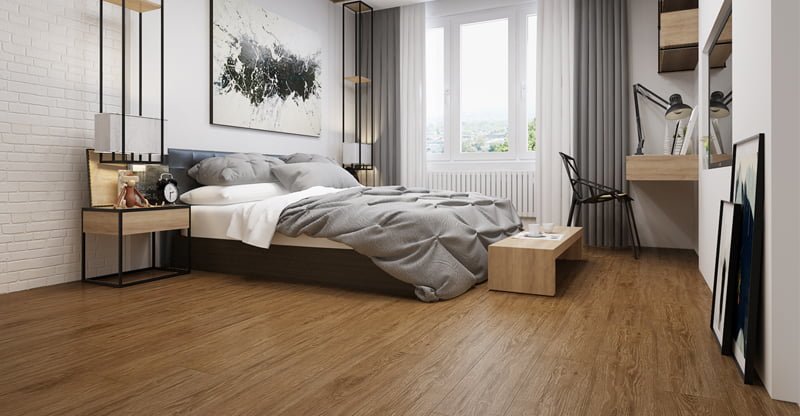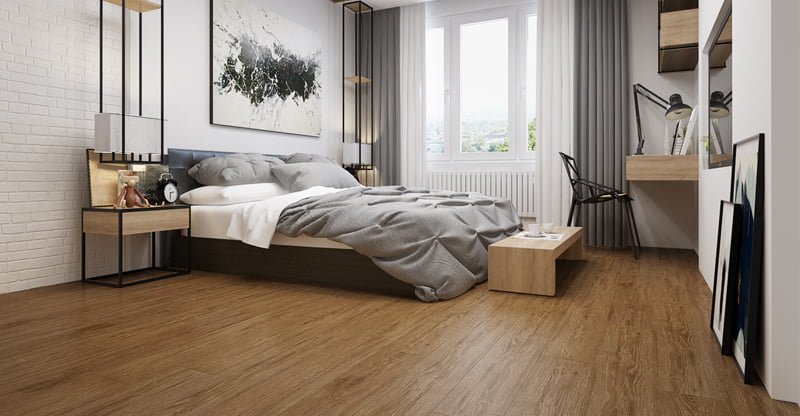There are many benefits associated with vinyl flooring, including its durability and functionality. So we will provide you here with everything you need to know before buying vinyl flooring. The versatility of its appearance and ability to resist moisture has made it a popular flooring material in recent years. Additionally, it is one of the most affordable flooring options. There is no limit to what luxury flooring materials vinyl flooring can mimic, such as wood, marble, stone, and many others.

The vinyl flooring is made up of several layers. Together, these materials produce a floor covering that is water-resistant, durable, and relatively inexpensive.
Before Buying Vinyl Flooring: What’s In Vinyl Flooring?
There are usually four layers of materials that make up a standard vinyl floor. First, the backing layer is made of cork or foam, usually at the bottom. Designed to serve as an underlayment for vinyl flooring, this material does not need to be installed before the vinyl flooring is laid down. It also functions as a cushion to create a more comfortable walking surface and to act as a sound barrier to keep noisy household noises at bay.
The waterproof layer (assuming the vinyl is waterproof) sits above the backing layer. The purpose of this layer is to absorb moisture without causing the floor to break down, as it will not cause swelling or compromise its integrity. Generally, there are two types of waterproof layers, WPC, which is made from a mixture of wood and plastic, and SPC, which is made from a mixture of stone and plastic.
It is the design layer that sits over the waterproof layer, which consists of a high-resolution image of your choice that is printed on your product. This design layer is printed in a way that resembles wood, marble, stone, and other high-end materials such as metals, stones, and leather.
Lastly, there is the wear layer of vinyl flooring, which sits on the top of vinyl flooring and protects it from damage and erosion caused by foot traffic. It is recommended that thick wear layers are used in areas that experience a lot of traffic, while thinner wear layers are appropriate for areas that experience less traffic.
Luxury vinyl flooring can even have more than four layers of materials on it, and usually, there are six to eight different layers. The floor may be finished with a clear top coat, which provides extra protection for the wear layer and gives the floor a sheen. It can also have a cushion layer crafted from foam or felt, which is designed to make walking on the floor more comfortable. And finally, a fiberglass layer supports the layers above it and ensures the flooring lies evenly and securely. So these are just some of the amazing layers that can help you decide before buying vinyl flooring.
Before Buying Vinyl Flooring: What Are The Types of Vinyl Flooring

Vinyl Plank Flooring
The design of vinyl planks is intended to mimic the look and feel of hardwood floors and comes in a variety of designs. It is no wonder that many people choose vinyl planks over wood since vinyl planks are water-resistant, stain-resistant, and easy to maintain in comparison to wood. Vinyl flooring of this type is best suited for high-traffic areas that are prone to wear and tear. So check the area where you want to install your new floor before you buy vinyl flooring.
Vinyl Tile Flooring
A vinyl tile is designed to resemble a stone or ceramic tile so that it appears to be like the actual tile. The vinyl planks are also available in a wide variety of patterns and colours that mimic the appearance of their natural counterparts in nature. The vinyl tiles are often installed with grout, which is an option that some people choose to add so that the vinyl tiles closely resemble stone or ceramic tiles. There is a reason why many people prefer vinyl tile for small areas of their house it can easily be cut down in order to fit small spaces, unlike stone tiles which tend to be more difficult to cut.
Vinyl Sheet Flooring
When it comes to vinyl sheets, they are thinner than vinyl planks and tiles and come in rolls that are up to twelve feet wide, making them easy to install. Due to their affordability and durability, vinyl sheets are a very popular choice for most people when it comes to covering large areas of their homes.
Luxury Vinyl Plank and Tile Flooring
Luxury vinyl planks and tiles are five times thicker than standard vinyl floors because they contain more layers. This additional material can be used to add a touch of realism to the flooring, especially when you want to recreate the look of wood or stone. Luxury vinyl planks and tiles can be produced using 3D printers, which makes them a great choice if you're looking for a realistic replica of a naturally-occurring material, such as wood or stone, on your flooring. Generally, luxury vinyl flooring planks and tiles tend to be more durable than standard vinyl flooring, with a lifespan of roughly 20 years, compared to standard vinyl flooring.
Rigid Core Vinyl Flooring
Rigid Core Vinyl Flooring is a type of engineered vinyl floor that has the advantage of an enhanced rigid core construction that provides dimensional stability. Rigid core vinyl flooring is a solid plank with less pliability, making it easier to install and more durable underfoot. The floor is an improved version of traditional vinyl floors that gives vinyl flooring a more wood-like appearance. Rigid core flooring is available in several types. WPC vinyl flooring and SPC vinyl flooring are the two most popular rigid-core vinyl flooring products available in the market today. Depending on the type of core construction, vinyl floors may be advertised as rigid core or with an abbreviation to indicate the type of core construction. WPC vinyl flooring is made up of wood plastic composite cores, while SPC vinyl flooring is made up of stone plastic composite cores.
Before Buying Vinyl Flooring: Here Are The Pros of Vinyl Flooring
Pros of Buying Vinyl Flooring
- This type of flooring is intended to last for a long time and is capable of withstanding a great deal more wear and tear than traditional materials
- A more affordable alternative to traditional flooring
- There are nearly infinite design options, so you will have plenty of choices when choosing a floor for your home
- Installation is relatively easy
Factors To Consider Before Buying Vinyl Flooring

Flooring’s Foot Traffic
So before you buy vinyl flooring, you must consider how much foot traffic takes place in the area of your house in question before deciding whether or not you should install a vinyl floor there. A vinyl floor is designed to last and to be able to handle a great deal of wear and tear, which makes it the perfect choice for areas that receive a great deal of traffic. Considering that some vinyl sheets are significantly thicker than others, you have to take into consideration the extent of protection which will be required in the area.
Flooring’s Environment
Vinyl flooring is often regarded as one of the most durable flooring options on the market, but there are a couple of instances where it does not hold up well. Considering that it is not particularly resistant to heavy loads, for example, you should avoid placing it in an area where large equipment might be installed.
Similarly, vinyl flooring can be damaged by sharp objects, so it should be kept away from any items that may cause scarring. Additionally, vinyl flooring can fade when exposed to sunlight for an extended period of time, so do not install it outdoors or in a room that is both indoors and outdoors.
The Current Floor
Vinyl flooring is easier to install on some surfaces than others and is best applied to surfaces that are smooth and clean prior to application. Vinyl flooring can be difficult to lay over a floor that contains flaws, such as an old hardwood floor because those flaws will appear underneath the new vinyl surface.
A layer of vinyl flooring may be laid over an older layer, but most manufacturers advise against doing so, since flaws in the flooring may appear over time.
In the same manner, although vinyl can be installed over concrete, the integrity of the floor may be compromised. For a better feel underfoot and a more uniform appearance, you may wish to add a layer of well-sanded plywood between your existing floor and your new vinyl floor.
Follow These Our Tips Before You Buy Vinyl Flooring
There are a number of advantages to vinyl flooring, including its affordability, adaptability, and durability. So before you buy vinyl flooring, you may want to consider our tips and which areas of your home are best suited for vinyl flooring. With so many options to choose from, there will most likely be something that will work for your home.
Other flooring blog articles you may want to read:
EVERYTHING YOU NEED TO KNOW BEFORE INSTALLING A NEW FLOOR
VINYL FLOORING INSTALLATION TECHNIQUES
WORD OF MOUTH FLOORS: LEADING PROVIDERS OF VINYL FLOORING IN VANCOUVER
